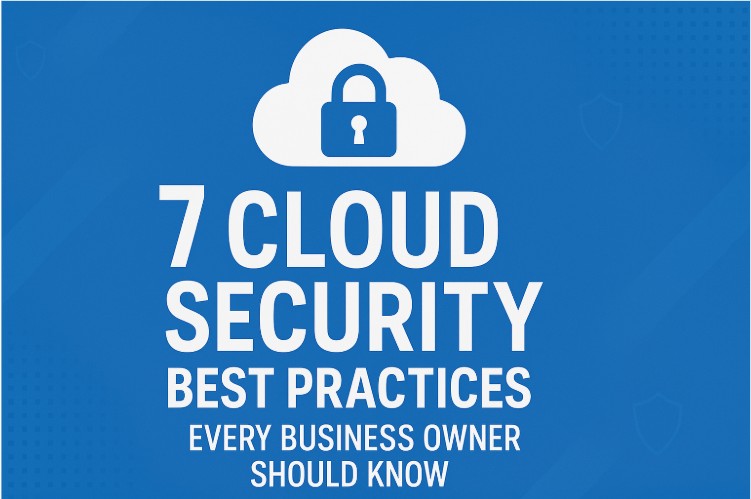Cloud computing has transformed the way businesses operate—enabling flexibility, scalability, and cost savings. But with these advantages comes a new set of risks. From data breaches to ransomware, cloud-based systems are prime targets for cybercriminals. The good news? With the right practices, you can significantly reduce your exposure.
Here are 7 cloud security best practices every business owner should implement:

1. Enable Multi-Factor Authentication (MFA)
🔒 Why it matters: Passwords are no longer enough. Cyber attackers often gain access through compromised credentials.
✅ Action: Require MFA for all employees accessing cloud apps. This extra step can block 99.9% of automated attacks.

2. Use Strong Access Controls
👥 Why it matters: Not everyone in your company needs access to every file. Excessive permissions are a leading cause of insider and accidental breaches.
✅ Action: Apply the principle of least privilege—only give employees access to the systems and data they need.


3. Encrypt Data in Transit and at Rest
🛡️ Why it matters: Data that isn’t encrypted is like sending a postcard through the mail—anyone along the way can read it.
✅ Action: Ensure your cloud provider encrypts data both in transit (moving between systems) and at rest (stored in databases or backups).

4. Monitor and Log Activity
📊 Why it matters: Without visibility, you won’t know if suspicious activity is happening in your cloud environment.
✅ Action: Use continuous monitoring and logging tools to detect anomalies, unauthorized access, or unusual data movement.

5. Regularly Back Up and Test Recovery
💾 Why it matters: Even the best defenses can fail. Ransomware attacks often target cloud data directly.
✅ Action: Schedule frequent backups and test recovery plans so you know business-critical data can be restored quickly.

6. Train Employees on Cloud Security
🎓 Why it matters: Human error is responsible for the majority of breaches. A well-trained team is your first line of defense.
✅ Action: Provide ongoing security awareness training, focusing on phishing, credential safety, and safe use of cloud apps.

7. Partner with a Trusted MSP
🤝 Why it matters: Small and midsized businesses rarely have the in-house resources to manage cloud security 24/7.
✅ Action: An MSP like ICG provides 24/7 SOC monitoring, threat response, and cloud expertise—ensuring your business is always protected while you focus on growth.

The ROI of Cloud Security
💡 Think of security as insurance for your business operations. The cost of implementing these practices (or partnering with an MSP) is far lower than the financial, legal, and reputational damage of a breach. Studies show SMBs can lose $200,000+ on average per incident—often enough to shut down operations.

Don’t Wait For A Breach
Your cloud is only as secure as the practices you put in place. Don’t wait for a breach to reveal the gaps in your defenses. At ICG, every client benefits from 24/7 SOC monitoring and proactive cloud security management.
👉 Ready to strengthen your cloud security? Let’s Talk.
.png)



